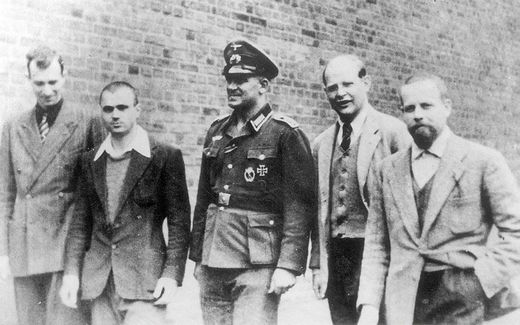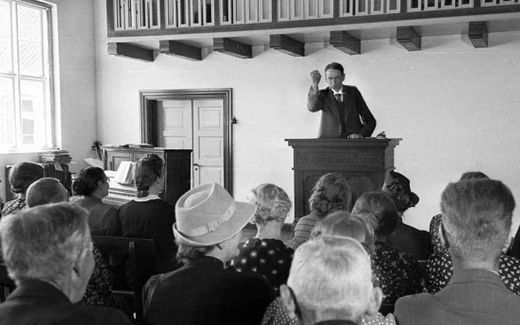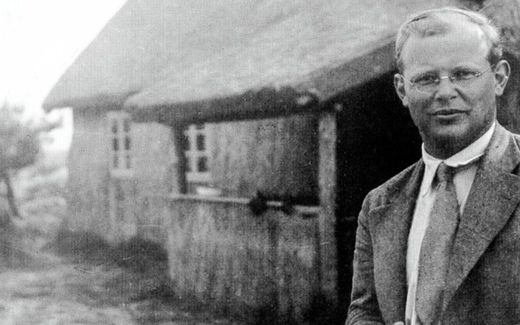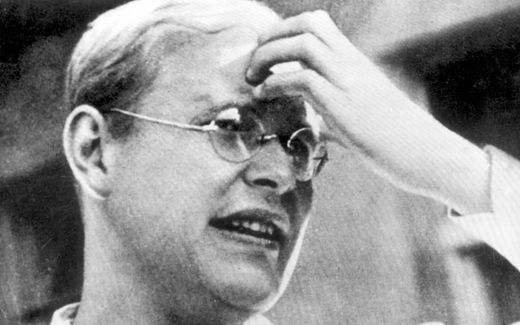Bonhoeffer movie is dividing his admirers – unnecessarily
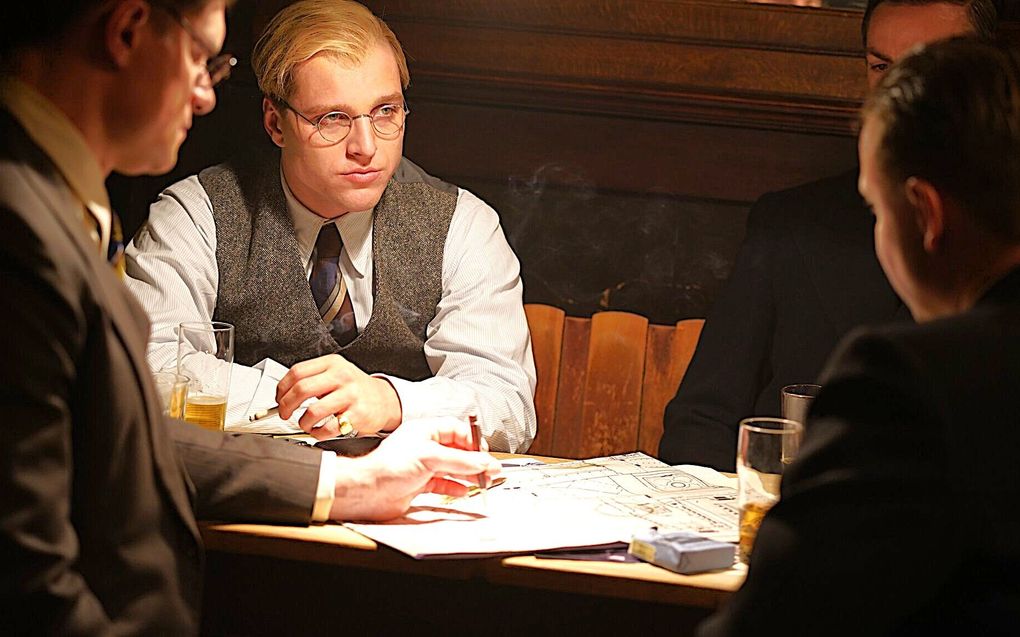
Discussing the plans with others. Photo Angel.com
Opinion
Dietrich Bonhoeffer could have had an impressive career. But he chose something else and ended being hanged. Still, he is read and remembered. The new film about him shows him sovereign and elusive.
In November 2024, a new movie about the life of the famous German theologian Dietrich Bonhoeffer (1906-1945) was released in the United States. This spring, it will be shown at European cinemas.
The movie roused fierce discussions in the United States, mainly because the film was supposed to have been primarily inspired by Bonhoeffer-biographer and Trump supporter Eric Metaxas. But feel free to watch the movie, even if you are not a fan of Christian Nationalism. The movie offers a pretty accurate view of Bonhoeffer, who is rightfully remembered as a convincing disciple of Christ.
Dietrich Bonhoeffer was a theologian and pastor and is still well-known in the Christian world. He was born into a well-to-do Berlin family that belonged to the Bildungsbürgertum: well-educated, civilised citizens. His father was a professor of psychiatry.
Dietrich studied theology and soon turned out to be a highly gifted student (his promotion took place when he was 21 years old), and he developed into one of the most influential theologians of the 20th century.
His influence was not only due to well-read books like Discipleship (Nachfolge) – a book about the life of Christians in imitation of Christ's life. He also became an inspiring theologian through his letters from prison, published posthumously as The Cost of Discipleship (Widerstand und Ergebung).
Bonhoeffer ended up in jail because of his resistance against Nazism, against the German Protestant Church, which dominated as it had become by the so-called Deutsche Christen (Christians supporting Hitler and his regime), and against the Führer.
As a member of the German resistance movement, he knew of the plans to assassinate Hitler (the well-known attempt by Colonel Stauffenberg on July 20th, 1944). When his involvement became known towards the end of the war, Bonhoeffer was hanged in concentration camp Flossenbürg on April 9th, 1945, at Hitler's order.

Disgraced
During the months preceding his death, Bonhoeffer, in his letters from prison to his friend Eberhard Bethge, philosophised about the question of how the Church, having disgraced itself by its support of Nazism, could bring up the Christian faith again in the post-war period.
In Bonhoeffer's view, the Church should voice a “Christianity without religion”, a faith no longer based on the significant presuppositions of the past. These included the beliefs that man is created by God, man is sinful, man will have to die and will be held accountable before God's judgment seat. Instead, he wrote that God is not a powerful God to weak people but a weak and suffering God to people believing they are strong and empowered.
That, at least, is what Bonhoeffer seemed to think. He proposed these ideas as thought experiments in an unfinished correspondence, broken off by his untimely death at the age of 39 years. But whole herds of theologians embraced these premature thoughts: they suggested a break with orthodoxy, and a plead for a new theology that spoke up for the poor and the weak and thus seemed to support a leftist political agenda.

The crux of this interpretation of Bonhoeffer was Bethge, who, after the war, presented himself as editor, interpreter, and biographer of Bonhoeffer. Still, there also was another interpretation of Bonhoeffer. The progressive interpretation was challenged in Germany by Georg Huntemann in his book Der andere Bonhoeffer. Huntemann's work became the catalyst in toppling previous views on Bonhoeffer, especially when more and more became known about him from his Collected Works.
Metaxas
The biography published by Eric Metaxas, however, went even further (Bonhoeffer: Pastor, Martyr, Prophet, Spy, Thomas Nelson, 2010). Metaxas's Bonhoeffer was not a modern, progressive theologian but a person converted to a real and living faith during his visits to black churches in Harlem, New York. He was a theologian, much more orthodox than previously thought, and even a pious American evangelical. The book was well-written, became a best-seller, and was translated into many languages.
Metaxas's new Bonhoeffer interpretation did not remain unchallenged. Critics wrote that his portrayal was historically inaccurate, theologically incorrect, and philosophically naive: Metaxas, essentially, had kidnapped Bonhoeffer and recreated him into his own evangelical image, it was said. Moreover, Metaxas became a controversial figure, because, after 2016, he revealed himself as an enthusiastic supporter of Donald Trump. To many, this coming out was Metaxas's definitive unmasking.
In 2019, Metaxas published two children's books about Trump: Donald Builds the Wall, and Donald Drains the Swamp, including negative passages about an angry girl that seemed to bear some resemblance to Alexandria Ocasio-Cortez and about an old and mad man who seemed to look like Bernie Sanders.
Even worse, after the elections of 2020, Metaxas supported the Trump campaign by going along with the accusation that the results of the elections were fraudulent. Metaxas not only claimed that Jesus would have sided with Trump but also stated that he was willing to fight the stolen elections until death followed, till his last drop of blood. On social media, he posted a picture of a Bible with a gun on top of it.

In Metaxas's view, a 'Bonhoeffer moment' presented itself: a historical situation in which resistance was to take the shape of Bonhoeffer's consent to a violent attempt to stop a tyrant, the tyrant being the Democrats. And Metaxas was not the only one to appeal to Bonhoeffer in this situation. In the conservative blueprint for the next administration (Project 2025), Bonhoeffer is also favourably mentioned a couple of times.
This appeal to Bonhoeffer, in this context, threatened to tarnish his name. For this reason, a group of German theologians, as well as the Bonhoeffer family, issued statements in which they emphatically distanced themselves from this annexation. The 59 theologians were indignant with the Christian-national rhetoric that put away opponents as Nazis and equated the conservative struggle against the Democrats with Bonhoeffers' struggle against the Nazis. More than 4,000 people signed their petition.
In an open letter, the Bonhoeffer family (86 of the 100 second cousins and grandnieces of Dietrich Bonhoeffer) spoke out against the falsification and abuse of the Bonhoeffer name by “extreme-right anti-democrats, xenophobes and religious agitators”.
When the movie's producer, Angel Studios, published an Instagram post of new Bonhoeffer movie, the move provoked indignation in the family. It showed Bonhoeffer, the Bonhoeffer of the movie, with a gun in his hand, accompanied by the words: “The battle against tyranny begins now. Watch Bonhoeffer: Pastor-Spy-Assassin".
According to the Bonhoeffer family, nothing characterised Bonhoeffer's lifelong struggle more than his opposition to narrow-mindedness, lack of liberty and exclusion. This very heart of his thinking needed to be proclaimed in a time of “intolerance, antisemitism, racism and xenophobia, of nationalism and authoritarian tendencies”. This condemnation tempted Metaxas to wild accusations against the Bonhoeffer family ('Jews hating fanatics'), uttered in the Glenn Beck podcast.
Apologist
To present Bonhoeffer on the rebound, against his annexation by Republicans and Metaxas, as a modern inclusion apologist, as the theologians and the family have done, is as unhistorical and misleading as the image they want to fight. As a conservative and monarchist, Bonhoeffer was rather right-wing in his political views, and he was a staunch opponent, for example, of abortion.
More important, however, in assessing this discussion is another point. The historical Bonhoeffer was in many respects somewhat hesitant. And as a Christian and theologian, he was not entirely convinced of having taken the right decision by getting involved with the plans to kill Hitler. He believed that his decision was necessary and a Gebot der Stunde (a necessary evil), but at the same time, an act that was ethically wrong, morally incorrect, an act he had to atone for. There was no justification for a killing.
These scruples of the historical Bonhoeffer do not bother the Bonhoeffer of the movie. From the very beginning, he is determined. As a pastor, he immediately speaks out against the Nazi annexation of the Church, and he is also very decisive in his willingness to act. “Our silence in the face of evil is evil itself. Not to act is to act”, he is recorded to say – an example of the many one-liners in the movie that have never escaped Bonhoeffer's mouth.
Dramatising a person's life during wartime may be open to this kind of simplification. The movie presents Bonhoeffer as a hero, guided by a clear moral compass, speaking out against evil and more than willing to get his hands dirty.
However, all this does not imply that this movie represents Metaxas's Bonhoeffer interpretation. The producer, Todd Komarnicki, has emphatically denied that the Metaxas biography was his only or most important source of inspiration. He read Bonhoeffer's books and more than one biography.
The movie does not exhibit Christian-nationalistic propaganda for Trump-like politicians either. A gun on a Bible is never seen in the film. Not a single passage suggests that Democratic politicians are as evil a threat as Hitler and that a violent assault on the Capitol may be seen as a reasonable instrument to stop them. When it comes to European cinemas, everybody should feel free to watch and enjoy the movie.
At the movie's beginning, young Bonhoeffer is purchased by his brother Walther and tries to disappear into invisibility. When Walther continues to chase his little brother, they storm Father Bonhoeffer's study. Father Bonhoeffer advises Walther to stop his efforts: “You will never catch that boy.” The movie proves the truth of this statement.
Neither Metaxas nor this movie have caught Bonhoeffer. Bonhoeffer is still standing, sovereign and elusive.
Related Articles


